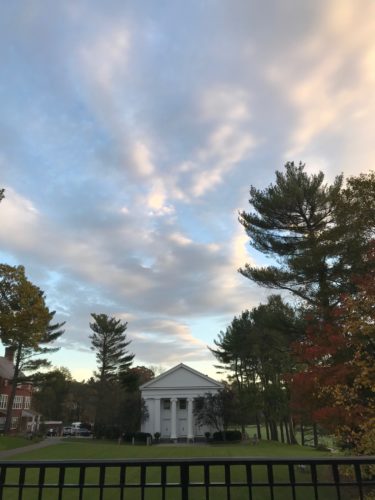
This is always a poignant time of year, and this year it feels more so than usual. I wrote last year about Thanksgiving 2002, when Matt’s father had his heart transplant, when the course of our family’s life bent permanently. Last year Matt’s whole family gathered to celebrate his parents’ 50th wedding anniversary, which was also the 14th anniversary of his transplant. It was a gathering none of us will ever forget.
Of course things are very different this year. Matt’s father is gone, and his sudden departure has punched a big hole in all of our lives. On Wednesday we’ll gather with his family, and on Thursday with mine. I can’t stop thinking of that morning in 2002, with our colicky newborn in the back of the car and my father-in-law still in a coma at Mass General. I can’t stop thinking of Thanksgivings in Vermont, before that, when Matt woke up before dawn to go hunting with his father and brothers. I can’t stop thinking of last year, and the spectacular Florida sunrises, and the heartfelt toasts to mark 50 years. The memories feel thick and close this week, sharp, vivid. The people who are gone feel near, and I wonder, as I often do, where they are. There’s so much I wonder about death, so many questions I have, both metaphorical and literal.
I wrote on Instagram last week of how this year I’m particularly aware of the losses that 2017 has brought to us. Of course, there have been many beginnings, too. We began this year with a strong sense of optimism, aware that 2016 had been a difficult year, and the first months were full of good news. Then, of course, came some bad news and some endings, Matt’s father’s death the most significant by a mile of a longer list. We come to the end of this year in a more reflective mode than we began it, but perhaps that is a normal rhythm. It strikes me that it probably is.
As the ghosts and memories swirl around me, what I feel, more than anything, is gratitude. I feel privileged to have lived those moments, even the difficult ones, and to have known and loved (and been loved by) the people who are no longer here. I feel thankful for the family who remains, who hold some of the same memories I do. I feel a tangible sense of honor to be on this earth, taking pictures and writing about my experience, looking at the sky, loving my family.
Kunitz’s words, “how shall the heart be reconciled/to its feast of losses?” run through my head. How to honor what is gone while also remembering what has begun? That is the task of these weeks for me. I feel thankful in a newly deep way, a gratitude shaded by the awareness of life’s losses and heartbreak. Maybe this is adulthood: an elegy for what is gone and a song of celebration for what is at the same time.
I think what I’m saying is that as I get older, difficulty and glory are more closely intertwined, the light and the dark of life more inextricable. Every joy is striated with awareness of sorrow, but the reverse is true, also. That’s either the most depressing thing I’ve ever written or the truest, I don’t know which. Maybe it’s both. But this period of my life is marked by a simultaneous embrace of what is – of thanks for what still is, in some cases – and the aching, echoing reminder of what was.
As I write these words it occurs to me that I am talking about nothing less than holding the fullness of life. The losses and the beginnings, the heartbreak and the beauty, the mundane and the magical. All of it, all the time, simultaneous, bittersweet, dazzling. Life itself.

